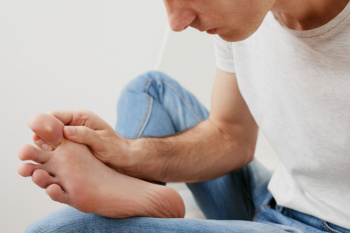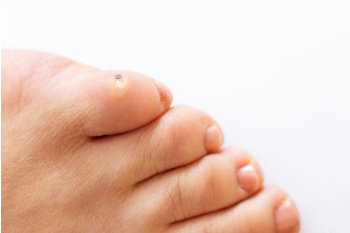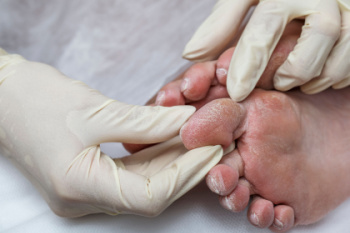Copyright © Michigan Foot and Ankle | Site Map | Nondiscrimination Policy | Design by: Podiatry Content Connection
 Plantar warts are common skin growths that appear on the soles of the feet. They are caused by exposure to the human papillomavirus, or HPV. These warts are often rough and spongy, and can be painful when pressure is applied while walking or standing. Plantar warts can be treated using a range of methods, depending on their size and severity. Salicylic acid, which gradually peels away the infected skin, may be used for mild cases. For more stubborn warts, a podiatrist may recommend cryotherapy, which uses liquid nitrogen to freeze and kill the wart tissue. Another effective method is laser treatment, where concentrated beams of light are used to destroy the wart. In some cases, minor surgical procedures might be necessary to remove the wart. Podiatrists, or foot doctors, are trained in the treatment of plantar warts. If you have plantar warts, it is suggested that you schedule an appointment with this type of doctor for effective solutions.
Plantar warts are common skin growths that appear on the soles of the feet. They are caused by exposure to the human papillomavirus, or HPV. These warts are often rough and spongy, and can be painful when pressure is applied while walking or standing. Plantar warts can be treated using a range of methods, depending on their size and severity. Salicylic acid, which gradually peels away the infected skin, may be used for mild cases. For more stubborn warts, a podiatrist may recommend cryotherapy, which uses liquid nitrogen to freeze and kill the wart tissue. Another effective method is laser treatment, where concentrated beams of light are used to destroy the wart. In some cases, minor surgical procedures might be necessary to remove the wart. Podiatrists, or foot doctors, are trained in the treatment of plantar warts. If you have plantar warts, it is suggested that you schedule an appointment with this type of doctor for effective solutions.
Plantar warts can be very uncomfortable. If you need your feet checked, contact one of our podiatrists from Michigan Foot and Ankle. Our doctors will assist you with all of your foot and ankle needs.
About Plantar Warts
Plantar warts are the result of HPV, or human papillomavirus, getting into open wounds on the feet. They are mostly found on the heels or balls of the feet.
While plantar warts are generally harmless, those experiencing excessive pain or those suffering from diabetes or a compromised immune system require immediate medical care. Plantar warts are easily diagnosed, usually through scraping off a bit of rough skin or by getting a biopsy.
Symptoms
- Lesions on the bottom of your feet, usually rough and grainy
- Hard or thick callused spots
- Wart seeds, which are small clotted blood vessels that look like little black spots
- Pain, discomfort, or tenderness of your feet when walking or standing
Treatment
- Freezing
- Electric tool removal
- Laser Treatment
- Topical Creams (prescription only)
- Over-the-counter medications
To help prevent developing plantar warts, avoid walking barefoot over abrasive surfaces that can cause cuts or wounds for HPV to get into. Avoiding direct contact with other warts, as well as not picking or rubbing existing warts, can help prevent the further spread of plantar warts. However, if you think you have developed plantar warts, speak to your podiatrist. He or she can diagnose the warts on your feet and recommend the appropriate treatment options.
If you have any questions please feel free to contact one of our offices located in Ferndale, and Milford, MI . We offer the newest diagnostic and treatment technologies for all your foot and ankle needs.
 Corns on the feet are often the result of rubbing and mechanical stress on the skin. When there is repetitive friction on a certain area of the foot, the skin may respond by thickening and forming a hardened, raised bump known as a corn. Bony prominences, such as the toes or the sides of the feet, are more susceptible to corn development caused by rubbing against the shoes. Corns can also form in response to wearing ill-fitting footwear, high heels, or possibly from having foot deformities that alter the distribution of weight and pressure on the feet. While corns themselves are not usually harmful, they can cause discomfort or pain, especially when walking or wearing shoes. Podiatrists, or foot doctors, can address corns through various treatments, such as trimming, padding, or orthotic devices to provide relief. If you are struggling with corns on the feet, it is suggested that you consult a podiatrist for personalized treatment options.
Corns on the feet are often the result of rubbing and mechanical stress on the skin. When there is repetitive friction on a certain area of the foot, the skin may respond by thickening and forming a hardened, raised bump known as a corn. Bony prominences, such as the toes or the sides of the feet, are more susceptible to corn development caused by rubbing against the shoes. Corns can also form in response to wearing ill-fitting footwear, high heels, or possibly from having foot deformities that alter the distribution of weight and pressure on the feet. While corns themselves are not usually harmful, they can cause discomfort or pain, especially when walking or wearing shoes. Podiatrists, or foot doctors, can address corns through various treatments, such as trimming, padding, or orthotic devices to provide relief. If you are struggling with corns on the feet, it is suggested that you consult a podiatrist for personalized treatment options.
Corns can make walking very painful and should be treated immediately. If you have questions regarding your feet and ankles, contact one of our podiatrists of Michigan Foot and Ankle. Our doctors will treat your foot and ankle needs.
Corns: What Are They? And How Do You Get Rid of Them?
Corns are thickened areas on the skin that can become painful. They are caused by excessive pressure and friction on the skin. Corns press into the deeper layers of the skin and are usually round in shape.
Ways to Prevent Corns
There are many ways to get rid of painful corns such as:
- Wearing properly fitting shoes that have been measured by a professional
- Wearing shoes that are not sharply pointed or have high heels
- Wearing only shoes that offer support
Treating Corns
Although most corns slowly disappear when the friction or pressure stops, this isn’t always the case. Consult with your podiatrist to determine the best treatment option for your case of corns.
If you have any questions please feel free to contact one of our offices located in Ferndale, and Milford, MI . We offer the newest diagnostic and treatment technologies for all your foot and ankle needs.

Diabetic patients require special attention to foot health due to their increased risk of developing complications such as neuropathy, poor circulation, and foot ulcers. Neglecting foot care can lead to serious consequences like infections, foot deformities, and even amputation. To maintain optimal foot health, people who are diabetic should adhere to a few simple tips. First, inspect the feet daily for cuts, sores, or blisters, as early detection is crucial. Second, wash and dry the feet thoroughly, paying attention to the spaces between the toes. Moisturize regularly, but avoid applying lotion between toes to prevent fungal infections. Additionally, wear comfortable, well-fitting shoes and never walk barefoot, even indoors. Regular exercise improves circulation, benefiting foot health. Most importantly, if you have diabetes, it is strongly suggested that you schedule regular check-ups with a podiatrist who can monitor foot health and promptly address any concerns.
Diabetic foot care is important in preventing foot ailments such as ulcers. If you are suffering from diabetes or have any other concerns about your feet, contact one of our podiatrists from Michigan Foot and Ankle. Our doctors can provide the care you need to keep you pain-free and on your feet.
Diabetic Foot Care
Diabetes affects millions of people every year. The condition can damage blood vessels in many parts of the body, especially the feet. Because of this, taking care of your feet is essential if you have diabetes, and having a podiatrist help monitor your foot health is highly recommended.
The Importance of Caring for Your Feet
- Routinely inspect your feet for bruises or sores.
- Wear socks that fit your feet comfortably.
- Wear comfortable shoes that provide adequate support.
Patients with diabetes should have their doctor monitor their blood levels, as blood sugar levels play such a huge role in diabetic care. Monitoring these levels on a regular basis is highly advised.
It is always best to inform your healthcare professional of any concerns you may have regarding your feet, especially for diabetic patients. Early treatment and routine foot examinations are keys to maintaining proper health, especially because severe complications can arise if proper treatment is not applied.
If you have any questions please feel free to contact one of our offices located in Ferndale, and Milford, MI . We offer the newest diagnostic and treatment technologies for all your foot and ankle needs.







